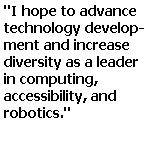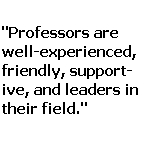Born in Tamil Nadu, India and raised in Columbia, MD, Kavita got her B.S. in Computer Science and Mathematics. In 2001, Kavita joined UMBC's graduate program in Computer Science to pursue her Ph.D. When she's not studying, Kavita likes to watch movies and listen to audio books.
About Kavita…
When did you know you wanted to study Computer Science?
I decided on majoring in Computer Science since high school but discovered my passion for computer science research during the completion of my undergraduate years.
Are you part of any labs, clubs or organizations on campus?
I am a member of the Cognition, Robotics, and Learning (CORAL) lab of Dr. Tim Oates.
What are you researching for your thesis?
My research goals are to provide assistance and increase independence for people with disabilities using machine learning, artificial intelligence, and robotic technologies to improve their quality of life. In particular, my research is focused on path planning and the development of an accessible robotic interface to assist users with activities of daily living. For example, I am currently investigating the use of brain computer interfaces, speech recognition, and facial gestures to control an interface for repositioning the arms of disabled users to strengthen their muscles and relieve pressure on the joints.
I am extremely grateful for the research support of the Louis Stokes Alliance for Minority Participation Bridge to the Doctorate fellowship, National Academy of Sciences Ford Foundation Predoctoral fellowship, and National Science Foundation Graduate Research Fellowship. These fellowships are instrumental in facilitating my research career in many ways and making it possible for me to be one step closer to achieving my goals to assist people with disabilities and the elderly.
Have you had any internships?
This summer I will begin an internship at Knexus Research to conduct artificial intelligence and robotics research.
Last summer, I participated in an AccessComputing Internship as a robotics interaction researcher working with Dr. Tim Oates. I implemented an accessible web interface to control a simulated robotic hand using WebGL. I also designed an interface with 3D graphical models, animations, and special effects using Blender and JavaScript.
I have also interned at IBM business consulting services and the University of Maryland School Of Medicine in the past.
 What are your plans after graduation?
What are your plans after graduation?
After graduate school, I plan to be a full-time researcher. I hope to advance technology development and increase diversity as a leader in computing, accessibility, and robotics.
What is your dream job?
In my dream job, I want to emphasize the importance of an inclusive environment for all by conducting research in academia or the industry. I want to increase the active participation of underrepresented minority groups in the community locally, nationwide, and internationally via research, especially people with disabilities, in order to improve their quality of life.
On UMBC and CSEE…
Why did you choose UMBC?
I chose UMBC for my graduate studies because I valued the more one-to-one teacher-student interactions compared to other colleges in Maryland, the size and accessibility of the campus was not too big or too small to accommodate my needs with a disability using a wheelchair, my positive experience in the Meyerhoff Scholarship Program as a UMBC undergraduate, and because I strongly believe that UMBC nurtures an environment for high-quality research and development in technology.
What was your first impression of UMBC?
I was on the UMBC campus during the Meyerhoff selection week for the first time. I was very impressed with the diversity of people from many different cultures and backgrounds all come together for the common goal of succeeding and pushing each other to succeed at UMBC. A diverse environment offers not only a greater learning experience, but also a greater social experience.
I love the positive energy of the campus. I always will remember the first time I heard our college president Dr. Freeman Hrabowski's favorite words by Langston Hughes, "Hold fast to dreams, for if dreams die, life is a broken winged bird that cannot fly." Those words broadened my perspective and gave me the confidence that success was guaranteed with hard work and sincerely giving your best efforts.
What was your first Computer Science Course?
My first computing course was CMSC 104: Problem Solving & Computer Programming with Dr. Chintan Patel.
What was your favorite Computer Science Course?
My favorite and recommended undergraduate courses are:
- CMSC 451: Automata Theory and Formal Languages that helped me understand the theoretical principles of Computer Science.
- CMSC 437: Graphical User Interface Programming gave me a perspective on the development of creative interfaces with a focus on the front end-user.
- CMSC 466: Electronic Commerce Technology provided me an opportunity to appreciate web technologies and applications for purchasing items online and understand the infrastructure of online shopping sites, such as Amazon and eBay.
My favorite and recommended graduate courses are:
- CMSC 601: Research Skills For Computer Science taught me how to thoroughly plan a research project and perform a literature review.
- CMSC 679: Introduction to Robotics presented an avenue to design, construct, program, and control an actual, real robot in the class project and learn about the latest robot technologies.
- CMSC 661: Principles of Database Systems offered a practical perspective of real-life data management techniques and procedures for maximizing efficiency.
 What do you like about the Computer Science and Electrical Engineering (CSEE) Department?
What do you like about the Computer Science and Electrical Engineering (CSEE) Department?
The Computer Science and Electrical Engineering Department is a positive place filled with wonderful professors that are very devoted to their students and really want students to learn. Everybody in the department is very passionate about academia and research.
How would you describe the professors in the department?
Professors are well-experienced, friendly, supportive, and leaders in their field. They are always willing to spend time with the students to help them grasp the material and eager to offer advice.
What advice would you give to incoming graduate students?
Computing is a promising field. Technology keeps growing every year so computer science jobs will always be in high demand. If you’re interested in a career in computing, take some time to figure out and plan your goals and discussed them with your professors, seniors, and peers in the department. Also, learn about the research work of those around you to learn from them and share your own experience with them so they can also learn from you.
Find a mentor in a computing field who can help you learn more about what it’s like. Learn more by browsing technical websites, like the Institute of Electrical and Electronics Engineers (IEEE) Spectrum and Wired.com—they are a rich source of inspiration and a way to keep up to date with current technology trends. Also, practice your programming skills—they’re important!
Come join us! You won't regret the best decision in your life. You could make very significant contributions in this field and be acknowledged for your abilities.